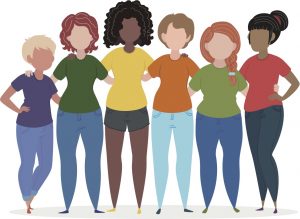 By Liza Baker
By Liza Baker
My husband and I have moved around a lot in the 25 years we’ve been together: from Colorado to Vermont to Illinois to California to Michigan.
We’re done now.
He says, “Well, you know, I do think that….” And I say, “You’re not listening, we’re done now.”
As many “tagalong spouses” have found, it can be difficult to have a career when you’re moving a lot—much easier to just take a job unless you are completely portable in an established career, or as they say today, “location independent.”
Once we were done moving (no really, we are done) and I figured out what I want to be when I grow up (seriously, 50 is in no way middle age), I started a home-based business, teaching healthy home cooking and meal planning as a side hustle while working full time at a local non-profit.
Over the past decade, that business shifted focus as I moved into more integrative health—in which the secondary foods (the ones we put in our mouths) are considered along with the primary foods (everything else that nourishes us … or doesn’t) when trying to uplevel a client’s health and well-being.
Along the way, I’ve been making some observations about women in community, specifically in community with other women.
Who are you?
I’ve seen how before 40 years of age, it’s not uncommon for women to completely lose themselves in their careers and/or child-rearing activities. Ask one of the more career-oriented women, “Who are you?” and they answer with their title. Ask one who’s focused on her family, and you’ll hear, “I’m so-and-so’s Mommy.”
As a working mother, I was surprised how often I did this myself, but then again, I find my own children incredibly in-curious about the adults in their friends’ lives. I seem to recall knowing the names and occupations of my friends’ parents by quite a young age—my kids don’t know, don’t care, #sorrynotsorry.
Their conversations go on about X’s mom, Y’s dad—it’s as though we as adults seriously have no function outside parenting. And let’s be honest, is it any wonder in this era of helicopter parenting that they really do believe they are the center of the Universe?
I’d never had problems integrating into new communities precisely because of my identity as a mother: you move to a new school, you’re Katerina’s and/or Nikolai’s mom, you get hit up to volunteer, you work a few school events, you’re in! (If you’re lucky, you avoid becoming a momunteer—those mothers who, my kids say with an eyeroll, “live at school.”)
It’s not too hard to grow roots the same way in a job: you move, you find a new job, you do good work, you’re in! You’re the new admin/project manager/program director/etc.
However, establishing oneself in a community as a woman of the “sandwich generation”—still caring for older children/adolescents and suddenly faced with parenting or at least taking on a larger caregiving role in that arena, can be much more difficult.
In part the difficulty lies in making a clear statement about who we with respect to others independent of others and to step into being ourselves, fully and unapologetically. And really, when’s the last time we actually had time to slow down enough to figure that out?
I can’t speak to what that’s like as a man, but I sense that women do this best in community, specifically in community with other women.
Sisterhoods: secret and not so much
More than 2 million people reportedly participated in more than 670 marches in DC, across the country, and around the world in January 2016.
While not all the marchers were women—shout out to all the men who donned pink and joined in—it was most likely the largest public display of sisterhood in my life so far. We came with our pink hats, our posters, and our pride, and we marched for a variety of reasons.
Not being a fan of crowds nor of negativity (I’d rather march and work FOR what I believe in rather than AGAINST anyone or anything I disagree with), I was hesitant to participate, but when my then 17-year-old daughter expressed an interest in going to the state capital, we compromised on attending the event in Ann Arbor: I marched with and for her.
Our immediate group boasted marchers from age 17 to age 82, and one of the speakers at the event mentioned a woman who told her, “I marched in the 60s. I never thought I’d march again in my 60s.”
“What happened?” a friend in my group asked our oldest marcher.
“We got lazy,” she replied. “The women’s movement got lazy. The civil rights movement got lazy. The labor movement got lazy.”
So here we are again. The political events of 2016 shook many in this nation wide awake. Sisterhood was on display in a big way in January 2017: our hopes for womankind and indeed, for humankind, are not secret and, for the most part, they are strikingly similar. The issues are big and at times appear very “in your face.” They are the issues that have become the property of politics: health care, equal rights, social justice.
And the experience made me think about the more secret sisterhoods—those that remain hidden until someone is brave enough or broken enough to tell their story, those that are still largely kept among women, those that are spoken of in hushed voices rather than shouted on the streets.
What secrets do we keep in fear that they must be something particular to us, that nobody else—not even another woman—would understand?
They’re mostly experiences that we feel don’t merit publicizing, those that seem small when compared to the ones that have already made the public stage. “I have no right to bring X up when others don’t even have Y.” And yet they loom large in our own lives and keep us from rising.
It’s the same whether we’re silent about feeling let down by others or letting down those around us, about worrying that our children (who others think are perfect) will turn out terribly damaged because we’re bad parents, or just about feeling trapped in what others consider is a fairy tale life.
I’ve found that when these topics do surface in conversation with other women, the result is not misunderstanding or avoidance; instead, you suddenly find yourself in a circle of women who claim you as one of their own. You realize that your perceived weakness is your connection to strength, and that you hold a membership in a sisterhood that embraces you so fiercely that you find yourself working to ensure that others find it easier to join you and move toward a different, more positive perspective and experience of life.
Liza is a full-time Integrative Nutrition® health coach, cookbook author, part-time consultant, woefully underpaid COO of a busy family of four, and a member of the WXW 100. Her work is grounded in the belief that women can live happy, healthy lives, meeting all our obligations and honoring our own wildest, sweetest dreams. Her programs support women 40+ who feel that the only way out of their overscheduled lives involves a plane ticket, a wad of cash, and a change of identity. Liza lives in a half-empty nest in Ann Arbor, MI and is passionate about health and happiness, education and exercise, SOLE/SOUL food and social justice. You can get a taste of her work at https://simply-healthcoaching.com and join her membership site, (Sorta) Secret Sisterhood, at https://simply-healthcoaching.com/membership/.
